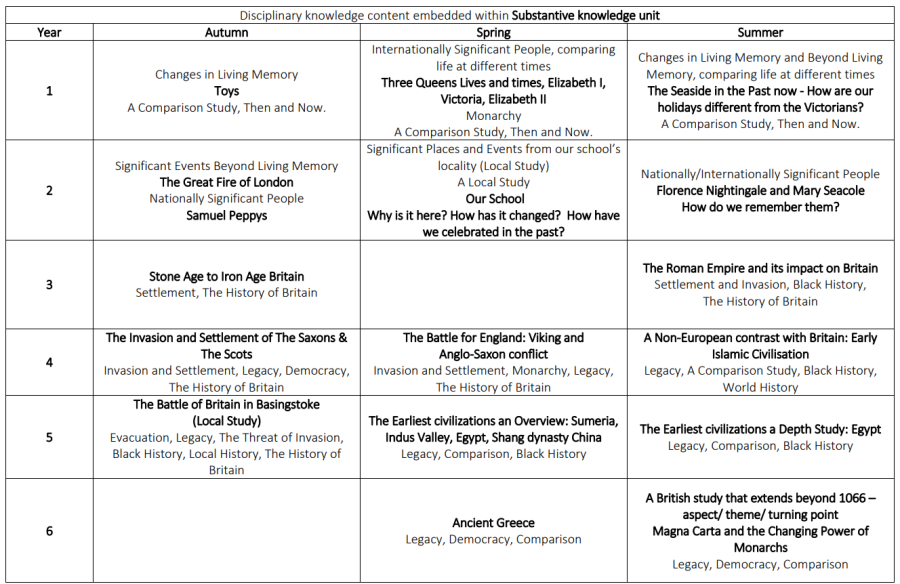History

Intent Statement:
The National Curriculum for history aims to ensure that all pupils:
-
Have a clear understanding of the chronological history of the United Kingdom.
-
Explore different influences on modern society, including both European and non-European depth studies.
-
Understand the development of invasion, settlement, monarchy, diplomacy, legacy, prejudice and empire.
-
Understand their own personal history and the connection this gives them to the wider world.
-
Have a clear understanding of the evolution of human society, from the earliest communities, to the modern age.
-
Have a clear understanding of key elements of our own local history and how this has shaped Basingstoke, Brighton Hill and our school community.
At Chalk Ridge, we know that history is key in providing opportunities for our children to develop their skills of enquiry, analysis, interpretation and problem-solving in order to prepare them for the next phase in their education. To ensure that pupils develop secure substantive and disciplinary knowledge which can then be built on, our history curriculum, through both key stages, is organised using a progression model, outlining the skills, knowledge and vocabulary to be taught and built on through each phase. Our history curriculum aims to teach critical thinking, encourage children to ask important questions and analyse evidence carefully in order to secure answers.
Implementation
In the Foundation Stage, children are taught history through key areas of learning set out within the EYFS Statutory Framework. Using a broad range of teacher-led, child-initiated and continuous learning opportunities, children will be taught:
-
Through Nursery Rhymes, Stories and Folk-Tales from the past, including those from other cultures, looking for differences and similarities, changes and continuities.
-
To understand that some things change and some things stay the same.
-
To look closely at similarities, differences, patterns and change.
-
To ask questions in order to investigate why things happen.
-
To develop their communication and co-operation skills.
-
To talk about their thoughts and opinions, sometimes recording them.
-
To identify and find out about features of the place they live and in the natural world around them including changing seasons.
-
To celebrate and commemorate events and festivals of historical significance.
In KS1 and KS2, children continue to build on their history knowledge with more formal, discrete History lessons. History units last between 6 and 12 weeks and are taught in blocks which alternate with Geography.

Impact
At Chalk Ridge, the high-quality teaching of history fosters a love and enthusiasm for the subject and for discovering the unknown. We measure this impact through:
-
Pupil voice which provides evidence that pupils are able to talk with confidence and enthusiasm about what they have learnt in history, using subject specific vocabulary;
-
Pupil conferencing which demonstrates that many pupils enjoy history and are able to recall their learning over time. They can identify key points of their learning as well as hooks and experiences that they have enjoyed;
-
Book scrutinies demonstrate that history is taught at an age appropriate standard across each year group with some opportunities planned in for pupils working at greater depth. Work is of a good quality and demonstrates pupils are acquiring knowledge, skills and vocabulary in an appropriate sequence;
Good quality implementation will ensure that pupils:
-
Become increasingly critical and analytical within their thinking, developing some of the skills required in KS3 and making informed and balanced judgements based on their knowledge of the past;
-
Have a good understanding of bias and perspective, understanding that different people can hold different viewpoints depending on their motivations and experience;
-
Become increasingly aware of how historical events have shaped the world that they currently live in;
-
Have a further understanding of history on a national level, local level and on a small-scale;
-
Develop enquiry skills to pursue their own interests within a topic and further questioning;
-
Encounter or participate in high-quality WOW moments to further appreciate the impact of history (where appropriate);
-
Retain prior-learning and explicitly make connections between what they have previously learned and what they are currently learning.
